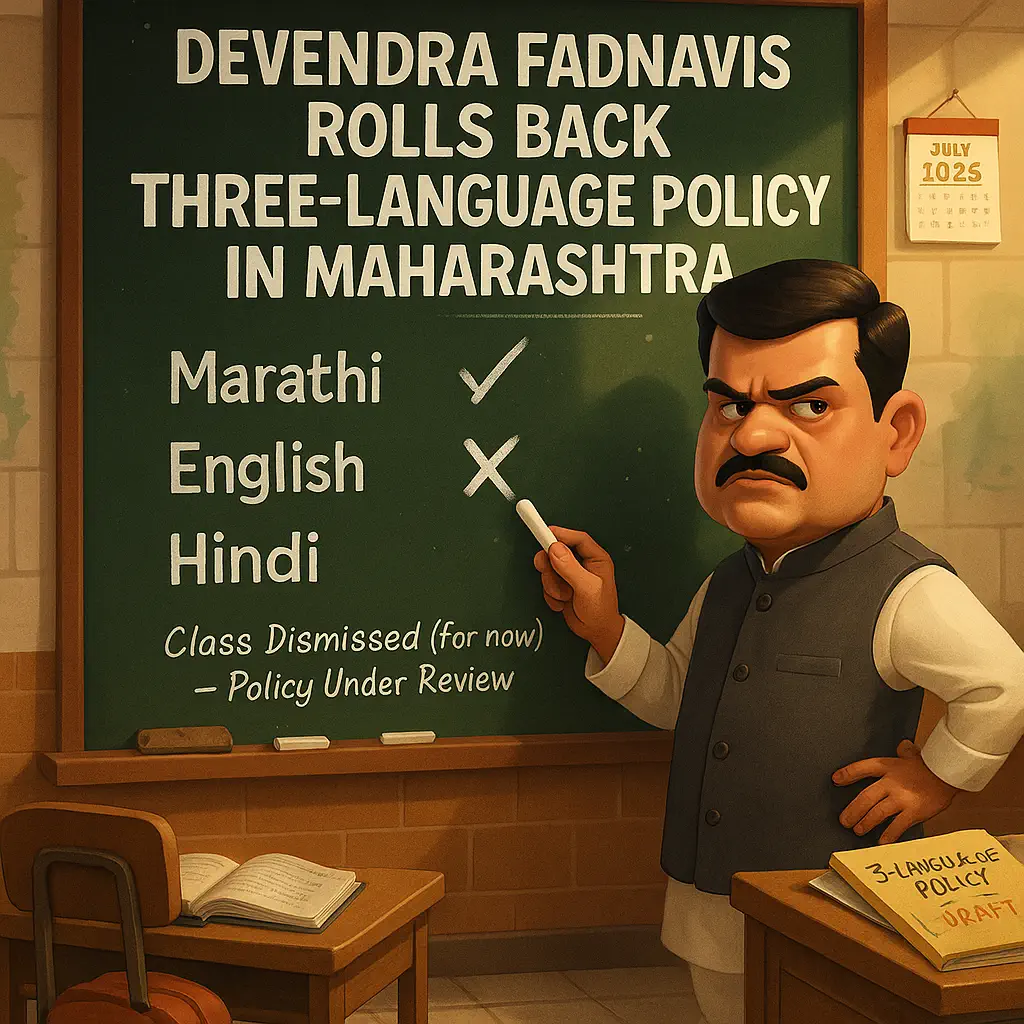Just when Hindi thought it had scored a VIP seat in Maharashtra’s classrooms, Chief Minister Devendra Fadnavis pressed the big red pause button. The state’s controversial three-language policy, which would have made Hindi compulsory alongside Marathi and English, has officially been put “on hold” until further review. And yes, apparently the policy needs to do some homework of its own.

The move comes after a series of sharp reactions from educators, opposition leaders, parents, and let us be honest every student who was already drowning in two languages and did not want to conjugate anymore verbs.
So What Was the Three-Language Policy Anyway?
The now suspended three-language policy was essentially a linguistic juggling act: it aimed to introduce a formula where students would learn Marathi (state language), English (instructional language), and Hindi (national language) compulsorily in schools. Inspired by the National Education Policy (NEP), this model wanted to make multilingualism the new normal or as critics put it, a sugar-coated attempt at pushing Hindi into non-Hindi states.
The proposal triggered instant backlash. Teachers flagged implementation nightmares. Political leaders warned of cultural imposition. Parents were already tired of supervising online homework and didn’t want to learn another script.
What Did Devendra Fadnavis Actually Say?
In a move that was part damage control, part diplomatic judo, Fadnavis stated that:
“The government has decided to keep the implementation of the three-language policy in abeyance until a committee of experts reviews it.”
Translation: We’re not saying no, but we’re definitely saying not now. And if we’re being honest, that’s political for let it die a slow death in committee.
Why the Sudden U-Turn on Three-Language Policy?
There’s no one reason; it’s more like a multi-lane pile-up of issues:
- Backlash from Opposition: The MVA (Maha Vikas Aghadi) alliance and other regional outfits came out swinging, calling it an attempt to bulldoze regional identity under the guise of “national integration.”
- Marathi Pride Alert: In a state where linguistic identity is sacred, making Hindi mandatory was a cultural tripwire.
- Logistical Madness: Implementation would’ve required retraining teachers, rewriting textbooks, and rewriting political manifestos if things went south.
- Public Fatigue: With syllabus overload, competitive exams, and the constant hum of CBSE vs State Board debates, most people just wanted fewer changes, not more.
What Happens Next With Maharashtra’s Three-Language Policy?
Now, the matter has been thrown to a review panel — the educational equivalent of the timeout corner. There’s no fixed deadline for when this panel will report back. Which, as most journalists will tell you, is usually the beginning of a very quiet end.
Expect the policy to either:
- Get a makeover with opt-in flexibility.
- Get regionalised, allowing schools more freedom.
- Or get shelved, only to reappear as election bait later.
How Does Devendra Fadnavis Three-Language Policy Tie Into NEP?
The National Education Policy advocates a three-language policy, but makes it clear that states are not legally obligated to follow it. Tamil Nadu famously shot it down. Karnataka pushed back. Now Maharashtra joins the growing list of states giving the policy a gentle, bureaucratic rejection.
TL;DR:
- Maharashtra proposed a 3-language policy: Marathi + English + Hindi.
- Public and political backlash followed.
- Devendra Fadnavis paused the plan, citing the need for expert review.
- A committee will now take months (if not years) to figure out what happens next.
- For now, Hindi will not be an added subject in state schools.
What This Means for Students, Parents, and Teachers
Short answer: Relax.
Students won’t need to cram for another language exam just yet. Parents won’t have to download another grammar app. Teachers can breathe since no sudden curriculum change is coming their way this semester.
But stay alert. This policy may come back in a new avatar later – more subtle, more optional, more… committee-approved.
Hindi Deserves Its Due, But So Does Sensible Implementation
Let us not beat around the blackboard. Hindi is our national language and has earned its respect. It bridges states, carries a vast cultural heritage, and unlocks literature, cinema, and communication across the country.
The opposition to the policy is not a rejection of Hindi. It is a call for nuance. Devendra Fadnavis’s rollback reflects the need to ensure language policies are inclusive, thoughtful, and grounded in practical reality.
Promoting Hindi or any language should be done in a way that empowers, not overwhelms. Hindi deserves more classrooms, but it also deserves better rollouts.
Final Word from The Peak View Stories:
In the grand theatre of Indian education policy, language is often the opening act and the closing controversy. This time, Maharashtra decided to pull the curtain early.
For now, Hindi is off the timetable. The panel is on the clock. And students? Well, they get to learn two languages, not three, unless the panel returns with a plot twist.
Stay tuned with The Peak View Stories because in Indian politics, nothing is truly cancelled. It’s just under review.
Disclaimer (Because Legal Told Us To): This story contains verified facts, informed opinions, and a generous helping of common sense. Our support for Hindi comes from a place of respect, not rhetoric. That said, The Peak View Stories isn’t here to draft your government memos or file your RTIs — we’re here to inform, provoke thought, and maybe make you chuckle. So don’t cancel us, consult someone with an actual government badge before taking any of this to the Parliament floor.